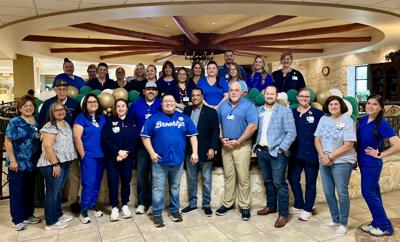Employees of DeTar Healthcare System gathered to raise awareness of men’s health issues and celebrate National Wear Blue Day on Friday. The event marked the official end of Men’s Health Week and was one part of DeTar’s celebration of Men’s Health Month.
The event, and the crowd it brought together eof dedicated health professionals dawning blue shirts, visibly reminded many of the importance of prioritizing men’s physical, mental and emotional well-being. Men sit at a higher risk of many preventable conditions that can be addressed or avoided with early detection and healthy lifestyle changes, afflictions like heart disease, high blood pressure and certain cancers.
“Our team proudly wore blue not only to support the men in our lives—our fathers, brothers, husbands, sons, and friends—but to encourage open conversations about health, prevention and early detection,” Bernard Leger, DeTar Healthcare System chief executive officer, said. “Raising awareness can be life-saving, and we’re committed to being a trusted partner in our community’s journey toward better health.”
A large number of men avoid routine checkups and visits to the doctor for reasons such as fear, discomfort or the desire to “tough it out,” according to a DeTar Healthcare System release.
“[Men’s Health Month] serves as a reminder for men to prioritize both physical and mental health—not just for themselves, but for the people who rely on them every day,” the release read.
Waiting until an issue manifests itself can be extremely risky, Dr. Daniel Espinosa with DeTar Medical Group, said. Prioritizing personal health is essential to maintain both physical and mental health.
“Preventive care might not be the most exciting thing on a guy’s to-do list—but it’s one of the smartest investments he can make,” Leger said. “At DeTar, we’re here to make it easier for men in the Crossroads to take care of themselves, whether that’s through checkups, screenings, or just having honest conversations about things like colonoscopies. They may not be fun—but they can save your life.”
There are a number of ways men can take care of their health and prevent diseases before they become unmanageable. It is crucial to see a primary care provider regularly.
Men should get routine screenings for blood pressure, cholesterol, diabetes, prostate cancer and colon cancer to detect problems early when they’re most treatable as well.
It is important to understand when to get a colonoscopy based on an individual’s family history and underlying medical issues that could make them more susceptible to colorectal cancer. Understanding blood pressure, cholesterol, blood sugar and BMI readings is essential to maintaining good health.
Lifestyle choices to maintain good health include eating healthy, being active consistently, maintaining a healthy weight, avoiding tobacco, limiting alcohol and prioritizing sleep. It is important to not ignore stress, anxiety or depression and to seek support through friends, hobbies or counseling if mental health struggles arise.
“Taking care of your health doesn’t have to be complicated,” Leger said. “We just want to remind men that a few simple choices—like getting regular checkups or staying active—can make a big difference. It’s not just about living longer; it’s about being there for the people who count on you.”




Commented